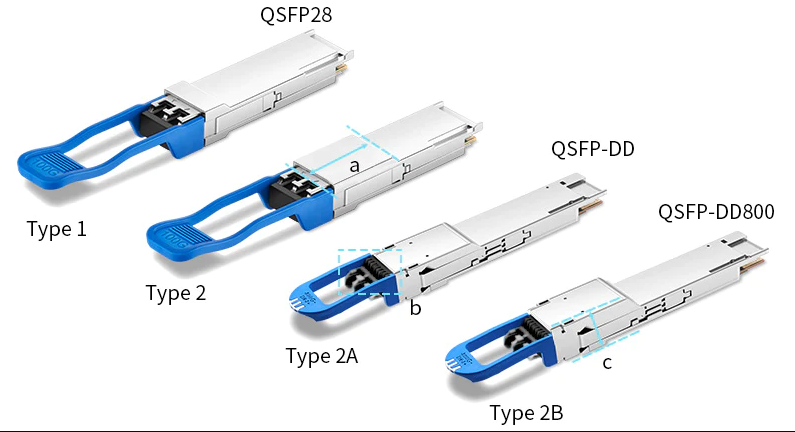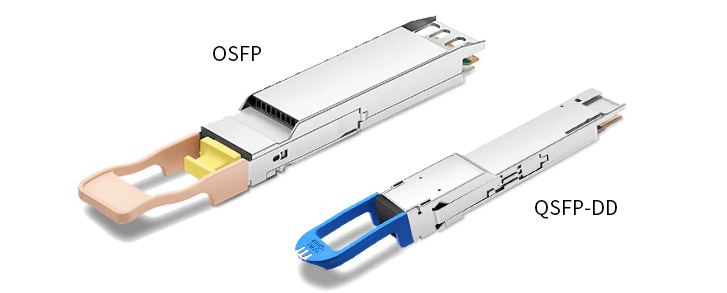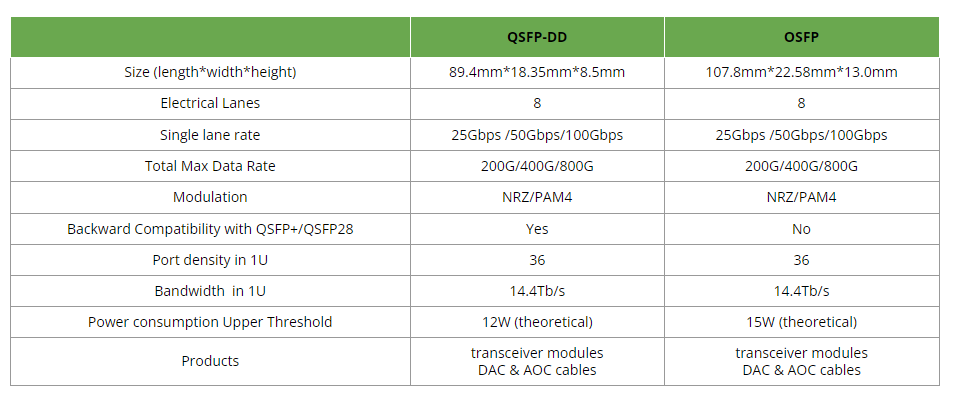

 Knowledge Base +
Knowledge Base +  2024.01.18
2024.01.18The QSFP-DD pluggable transceiver supports quadrupling the bandwidth of traditional QSFP modules, allowing network equipment to keep pace with advances in ASIC technology. The system designed for the QSFP module will be backward compatible with the existing QSFP form factor, providing greater flexibility for end users, network platform designers, and integrators.
The hardware specification of QSFP-DD version 6.2 defines a module and the stack height of the integrated box/connector system and the single height box/connector system. The MSA redefines the range of QSFP shape factors, an industry-leading, multichannel, pluggable form factor commonly used in Ethernet, Fibre Channel, and InfiniBand.
The initially released QSFP can run on 40 Gbps and 100 Gbps network applications, while the current QSFP-DD can aggregate up to 800 Gbps on 8 x 100 Gbps electrical interfaces.
Published QSFP-DD transceiver comes with QSFP-DD 200G and QSFP-DD 400G. The maximum speed capacity is due to different modulation technology. QSFP-DD200 supports a total of 200G by each of the 8 channels carrying a 25G data rate with NEZ modulation. With PAM4 modulation, QSFP-DD400 each channel will run at a maximum of 50G to offer a total of 400G data rate.
QSFP-DD800 is the enhanced version of QSFP-DD, with backward compatibility with all QSFP form factors. However, the QSFP-DD thermal whitepaper clearly points out its differences from the standard QSFP-DD. QSFP-DD800 is the industry's smallest form factor of the 800G module that provides a data rate of 800G. It has further developed the QSFP-DD spec with optimized features, such as signal integrity performance supporting 100Gb/s electrical IO in 8 lanes, and a type 2B mechanical design for adding connector port separation by increasing the height of the nose heatsink.

Type 1: QSFP28 mechanicals
Type 2: longer back cage to make room for internal design
Type 2A: QSFP-DD adds a heatsink to allow better cooling
Type 2B: QSFP-DD800 heatsink is higher to make room for the internal connector port separation
Based on QSFP-DD Specifications
Take 400G QSFP-DD as an example, there are 400G SR8, 400G DR4, 400G DR4+, 400G FR4, and 400G LR4, 400G LR8, and 400G ER8. These QSFP-DD transceivers, designed with different physical characteristics and performances are to address multiple deployment applications. The selection covers optical connectors, working wavelength, media, maximum transmission distance, transmitter and etc. The QSFP-DD specs are shown in the table below.

Both OSFP and QSFP-DD support 400G and even 800G data rates, which makes the two become the best options for spine/leaf and core networks. OSFP connectors and QSFP-DD connectors are made in 200G/400G/800G optical modules, and 400G DAC and AOC cables.

Compared to OSFP, QSFP-DD features slight advantages in adaptability and
flexibility with existing networking infrastructures. QSFP-DD is backward
compatible with all QSFP form factor transceivers such as QSFP+ and QSFP28, the
most prevalent 40GbE and 100GbE in the industry. Given that OSFP has a bigger
size, it cannot directly compatible with QSFP. If you need to connect the OSFP
optic to the legacy QSFP28 port, an adapter is required. 
The major differences between QSFP-DD vs QSFP system modules that are compliant with QSFP112 MSA are:
Physical characteristics
Longer extension beyond the faceplate
adds a QSFP-DD heatsink to facilitate cooling
eight electrical interface lanes against four
Data Rate
A total Data Rate of 400G and even 800G against 100G and 40G
A Single channel Data Rate of 25G/50Gand even 100G against 25G and 10G

Do you now have a better understanding of QSFP-DD transceiver modules? As the data center and high-performance computing market continue to evolve, new standards and technologies like QSFP-DD will be developed to keep up with the demand for higher bandwidth and data transfer rates.
If you’re looking for a QSFP-DD transceiver, Optcore is a great place to start your search. We offer a wide selection of QSFP-DD transceivers that are compatible with a variety of networks and applications.
Read More
What kind of fiber is used by the QSFP DD 400G LR4 optical transceiver
How does the QSFP DD 400G LR4 optical transceiver accomplish a data rate of 400Gbps
How far can the QSFP DD 400G LR4 optical transceiver reach
Subscribe to the newsletter
for all the latest updates.
2-5# Building, Tongfuyu Industrial Zone, Aiqun Road, Shiyan Street, Baoan District, Shenzhen. China
